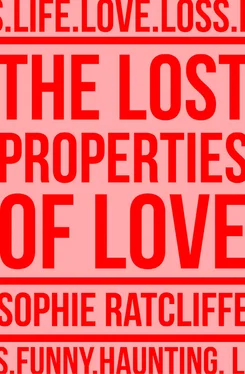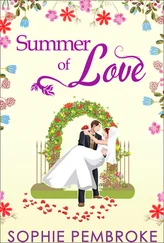Not that your face was much to write home about. Not that I could write home about it in any case. Happily married women don’t write home about other men’s faces.
There’s a flash of names beneath the bindweed. Shipham Valves. Wan Hai. Atlas Leisure Homes . Then levelling out to follow the motorway, chasing the cars past the Humber. The light changes, turns brighter, over the stretch of brown with its drag of sand. I open my bag to look for my book. In a week, my students will get back and my lectures are still unwritten. They’ll have their own copies of different books, and most will remember to bring them. Some of these books will be well-read, well-thumbed, decorated with lines of tiny Post-it notes like stiff fluorescent tongues. Others will look more like mine – almost brand new, with an uncreased spine and a shine to its cover. This is the fourth Anna Karenina I have bought. I have a habit of losing anything I am trying to work on, of leaving it in a cupboard or a suitcase or a plastic bag. Somewhere, back home, there are three other books like this. Each has its own cover, its own bends and creases, and corners rubbed with wear. They will turn up in the end, among piles of paperwork or under the bed. Eventually, I will group them all together on a shelf, and they will stand there, reproachful relatives, as if I should have stuck to one of them. I turn the title page. All happy families are alike, each unhappy family is unhappy in its own way.
That’s not the real first line of course, but I have no Russian. I close the book and look out of the window. The train goes over a metal bridge with a whistling sound, then past the endless backs of houses. We are stopping and starting now, slowly enough to peer into other people’s conservatories, at their laundry and sheds and swing sets and greenhouses and statues of frogs on toadstools, and upturned trampolines, then out to the fields lined with yellow rapeseed, and the crowd of wind turbines, circling like alien gymnasts. I press my finger against the glass again and try to write.
Someone I nearly loved is dying.
The letters evaporate, replaced by lines of turbines, receding into the distance, grey and slim. One has got stuck mid-cycle. Its paddles seem to droop against the sky. Perhaps it can’t go forwards without turning back.
‘Every heart has its own skeletons’, as the English say
Leo Tolstoy, Anna Karenina
Anna opens her book and starts to read, settling back on the white sprung seat nearest to the window side. She turns the pages carefully, studying the shape of the words and feeling the soft, thin paper between her fingers, then looks up and around. There is a pleasant kind of loneliness to this train world. A moment where she can ask where to be, how to be a person, when the strings of life have been loosened from around her. The others seem deep in thought. Perhaps they are loosened too. The first-class carriage seats four. Four bodies, set against a background of patterned wallpaper – two, like her, staring into the distance, lost in thought. A mobile salon. She is unencumbered, her smaller bags and trunks stowed on the luggage rail above her head, the hatbox on the top of the pile pulsing slightly to the train’s rhythm. The telegraph wires disappear in the distance like broken trees, and outside the window the skeins of smoke float gently upwards, then break into strands, vanishing, as if lacking the conviction to go on. The older woman opposite has finally drifted off to sleep. Anna fingers the covered seat button, feeling the pressure of compacted horsehair under the fabric. The oil lamp is growing dimmer, but still gives her enough light to read. She sips her glass of tea in its silver holder, half-conscious of the sound of the train jolting over the rails. She follows the rise and fall of the English prose.
The characters in her book walk in and out of rooms with boxes of papers. A government minister forms an alliance. A woman called Kate rides to hounds. Anna imagines joining the ride, sitting side-saddle in her habit, with a fur collar and dancing eyes. A proposal might happen. A frisson. Everyone is watching as they jump the fence. It would make a good picture.
Her album sits on the arm of her chair, the album she carries everywhere. Inside it is her son’s portrait. Her favourite photograph, the latest one – him in a white smock, sitting backwards on a chair, with frowning eyes and smiling lips. This was how he looked. It was his best, most characteristic expression, the one he brought to her when he wanted a new toy or another story at bedtime or a warm cup of milk or a song. She can only think of him with a smile. Her small love.
Tolstoy is good on details, like smiles and soup and eyes and trains. He is good on the small things – those miraculously ordinary things that make up life. He writes of the way Anna’s train pulls into the station, the coupling rod of the middle wheel slowly and rhythmically turning and straightening – of the muffled, hoarfrost-covered driver and the puffing steam … forced downwards by the icy cold as it draws into a platform. He notices the look of a luggage wagon, the sound of a little yelping dog . He writes, in a letter to his cousin, of the minute particulars of each of his children. One finds that currant jelly and buckwheat make his lips itch. Another turns his elbows out as he crawls around the kitchen floor. In the 847 pages of my paperback Anna Karenina , he tells us the precise colour of a mushroom, the type of leather on a sofa, and the way it feels to scythe a field of grass. He knows the places people keep their slippers and their dressing gowns, the particular North Sea coast where their oysters are sourced. He knows how people worry about their faces getting wrinkles, or about sick cows, or about running out of milk. He lists the things in one man’s pocket – the cigarettes, the pocketbook, the matches and the watch with its double chain and seals. He watches someone order cabbage soup. He describes the texture of a still-damp morning paper about to be read, the pattern of hairpins clustering at the nape of a woman’s neck, the little muff hanging from the cord of a skating girl’s coat.
Objects mattered to Tolstoy. They spoke, saying something in their intractability, in their power. The smallest of treasures. The properties that for him, constituted the whole of memory and the feeling of love. The tiny ball hanging from a nursemaid’s necklace. The plaited belt of a dressing gown, hanging down at the back. A pair of handmade boots. Perhaps these things mattered to Tolstoy because he had lost so much. As a young soldier, he had taken to gambling. The debts mounted up. He wrote back to his lawyer. Sell something, he said. The lawyer sold his house. Yasnaya Polyana. It means Bright Glade. When Tolstoy got back, they’d dismantled most of it. He was left with a hole in the ground.
He made his home in the little that remained and built on it. A new Bright Glade, next to the old, in the countryside south-west of Tula. There is a whole room at Yasnaya devoted to his stuff, ranged behind the cabinets, stacked carefully in tissue-paper-lined chests. You can see it all there – and more of it in his Moscow house. His music collection and his handmade shirts. His bicycle and dumb-bells. On his desk, under a glass box, there are two brass candlesticks. Three inkwells are ranged on a stand. A small brass dog and a paperweight sit beside a tarnished silver pot of quills. His writing chair is low, legs sawn down so that he could get closer to the paper as his eyesight failed.
Tolstoy needed to be close to things. Art, for him, begins with the smallest of differences. It begins where minute and infinitesimally small changes occur. Real life is not lived, he wrote in the big stories. Truth is not where people fight, and slay one another . Life is in the between-ness, the space in the margins – not in the headlines. It is in the brokenness of everyday things. Every one of the changes in the world comes to pass, and comes to be felt, through the pulse of our lives, through the smallest of happenings. We exist and make our way to our own truth in the same small fundamental movements, around the tiny portions of our own lives.
Читать дальше












